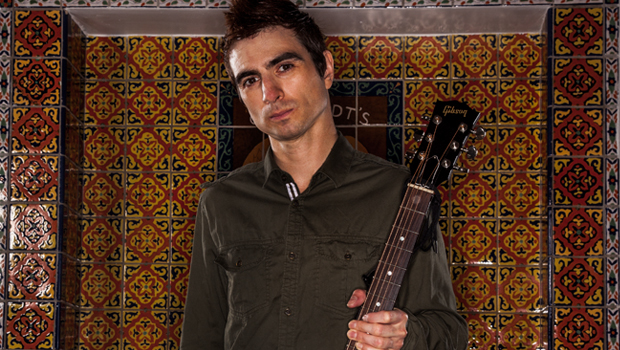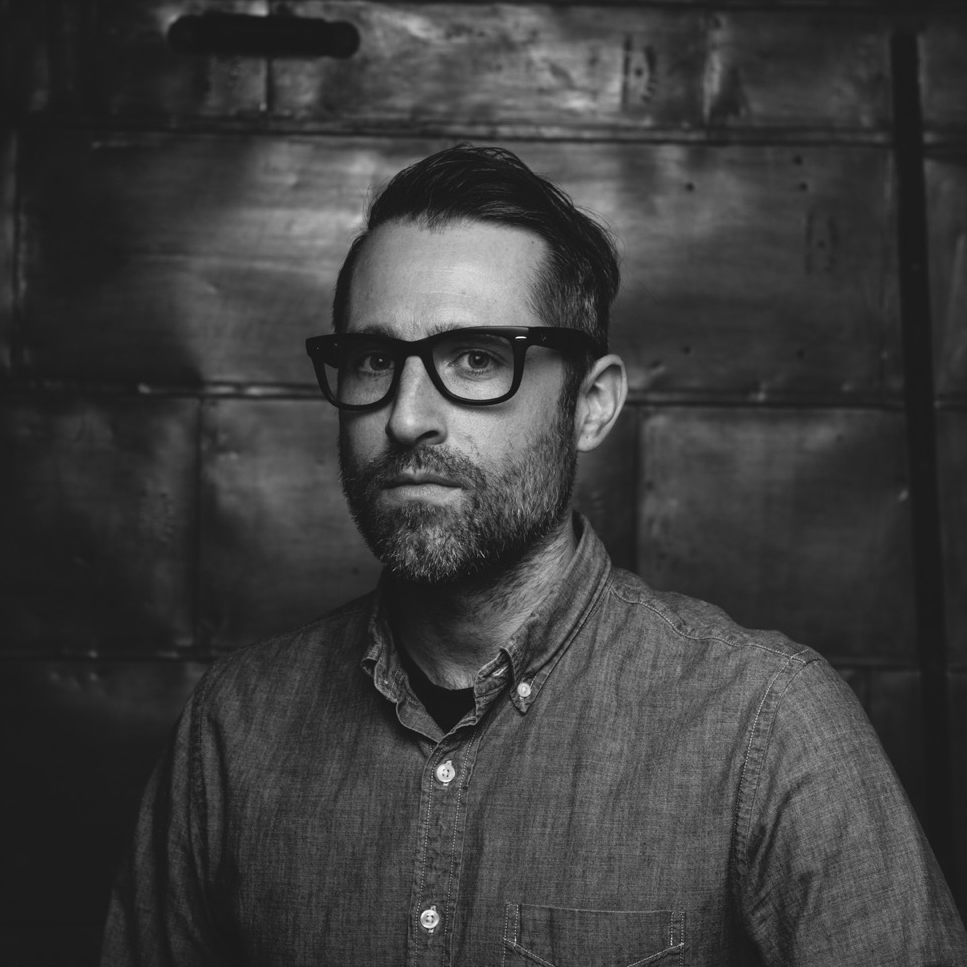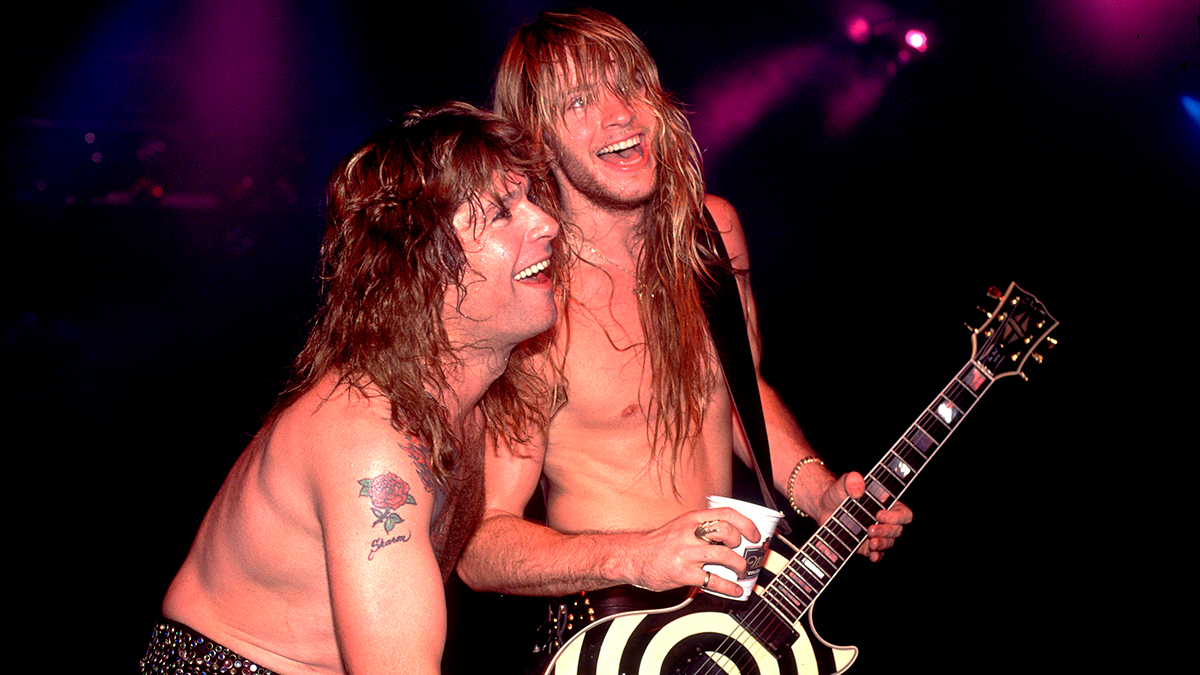Dear Guitar Hero: Justin Sane of Anti-Flag Answers Readers' Questions About Gear, Influences, Songwriting and More

Here's our Dear Guitar Hero feature with Justin Sane of Anti-Flag, who answers readers' questions about gear, influences, songwriting and more.
I love “1915,” from your new record, The General Strike. The riff is so rad, as is the message. Why did you choose to write about labor activist Joe Hill? — Eddie Rooney
Anti-Flag have a long history of activism. We grew up in Pittsburgh, where there’s a deep labor history. Some of the most famous strikes in history took place there, and many people in my family were involved in those strikes. So Joe Hill is a figure in labor history that I’ve known about for a very long time. And the idea of writing a song about him just felt timely.
We saw what was going on in Wisconsin with [anti-union] Governor Scott Walker butting heads with people over basic workers’ rights, like an eight-hour workday, a minimum wage and the right to collective bargaining. People like Joe Hill stood up for these same rights [100 years ago]. And right now we see people, whether in the labor movement, Arab Spring or Occupy movement, that are putting themselves on the line for what they believe in. And Joe Hill seemed to capture that same spirit.
What’s your current guitar-and-amp setup, and what’s your “must-have” effect pedal? — Simon Adamley
My must-have effect pedal is the yellow Boss [Overdrive/Distortion OS-2] pedal. It’s a basic, old-school, meat-and-potatoes distortion pedal. When I’m going for a lead, I just crank it as much as I can. As far as my setup, I use a Marshall JCM 900 Lead with a 1960 cabinet. I’ve found that if I have a really hot-wired Marshall head I can play almost any guitar and get the sound I want.
How are you able to make a living these days when you’re not making pop music like Kanye West or Taylor Swift? Do record sales even matter anymore? Or is it just about touring and selling merch? — Sloane Peters
All the latest guitar news, interviews, lessons, reviews, deals and more, direct to your inbox!
[laughs] We have almost zero record sales, so it is all about touring. Luckily, we’re a band that enjoys being on tour. It is very difficult making a living in music these days, especially playing in a punk rock band, which isn’t the “in” thing right now. I’ve seen a lot of bands around our level of fame that have just dropped off because they couldn’t afford to pay the bills anymore.
But Anti-Flag come from a DIY background, and we’ve never been afraid to get our hands dirty and do some of the work that the crew might do. I think our love of doing what we do really makes us willing to make sacrifices. At this point, everything from our crew to our income has been cut in half. We have 50 percent of the resources we had only three years ago. It’s not just us, either; it’s almost every band I know. These days it’s about adapting or dying, and luckily we’ve been able to figure out how to make it work.
What inspired you to first learn guitar? — Krissy Acevedo
I grew up in a really musical family. I’m the youngest of nine and Irish to the core. My dad’s Irish, and I have both U.S. and Irish citizenship. We all grew up playing Irish music. My family was sort of like Flogging Molly or the Pogues — all contained in one family. [laughs] We’d just sit around and have Irish music sessions. But I never took the guitar seriously until I was about 15, when I saw the movie Another State of Mind. It documented what is probably one of the first punk rock or DIY tours.
It was in 1982 and featured Social Distortion, Youth Brigade and Minor Threat. These guys toured around the U.S. in a school bus, and when I saw that movie I knew I wanted to be in a punk band. It looked like so much fun and they were all talking about stuff I could relate to. So I decided to start working on guitar and start a band. I played drums at the time — I’m actually still probably a better drummer than guitarist. Anyway, my best friend at the time had a drum kit and I had a guitar, so we just formed a band.
It seems like political turmoil has given rise to some of the world’s most powerful music. Do you think a similar thing will happen now because of Occupy? Or maybe it’s already happening? — Richard Edson
I think it has happened. The difference is where and how the music is being distributed. There’s this amazing documentary called Sounds Like a Revolution and it illustrates this issue in a really concise way. It talks about how in the Sixties there were hundreds of major labels that had access to radio airplay. And as a result some of the biggest protest songs actually got played on the radio. Over time labels have consolidated.
I think there’s only, like, three major labels now, and those labels don’t see political or protest music as being profitable. Their bottom line is the money, not the message. Anyway, there’s this whole comp, Occupy This Album, which has four CDs of music. Anti-Flag’s on it, as well as a lot of other artists. But it’s not something that’s gonna get airplay. But I think your point is true: turbulent times create great art. If we’ve got to find a silver lining to corruption and evil people in the world, there it is!
I live in a small town in Pennsylvania that has a lot of conservative people. It’s really hard to get support for my punk band, and we take a lot of shit. Did that ever happen to you? — Stephen Blake
Oh, yeah, we definitely dealt with that. When we started in the early Nineties in Pittsburgh, it was pretty much the kind of town where people drank beer and listened to classic rock. It was very hard going. There wasn’t even anywhere to play a show. If you told a club you were a punk band, they wouldn’t book you. So we’d lie and tell them we were a pop band. Then 50 dudes with mohawks would show up. [laughs] I think the main thing is that you just keep at it.
You try to find like-minded people in your area and work together to find a creative space where you can put on shows and have a platform to show other people what you’re doing. Then it’s about networking with like-minded people outside of your city. That kind of camaraderie gives you motivation and inspiration to keep going. That’s how we first progressed, but it didn’t happen overnight. Just don’t give up!
You guys are known for your dedicated fan base and crazy shows. What would you consider to be the most powerful live gig you’ve ever played? — Ritchie Grayson
We played in Kuala Lumpur, in Malaysia, not that long ago. Malaysia is an incredibly racist country. There’s a big divide between what’s considered the native population and the Indian and Chinese [ethnic minority] populations. There’s intense discrimination; it’s even institutionalized by the government. When we got there, all the kids wanted to talk about this with us.
We had an incredible show during which we talked about racism and also about how, at that very show, there were representatives from all three of those groups, and they were all rocking together and having a great time. It was really inspirational that music could bring these people together. You could tell that even in a country so highly fractionalized by racism, there were people who had figured out that those barriers and bigotry were bullshit. And those people are the ones that can instigate that change.
In my opinion this is a real pivotal time in U.S. history. What is the one issue you feel young voters should be aware before the upcoming presidential election? — Tom Spratley
Oh god. Just one? I do agree that we’re at a really pivotal point. I think one of the biggest issues that’s being brushed over in America is the environment. The world’s at a tipping point. There’s a swirling mass of plastic garbage in the Pacific Ocean that’s the size of Texas. You can’t clean that up! The oceans are dying. They’re becoming acidic from everything that’s dumped into them, from laundry detergents to industrial runoff.
Look at [the disaster in] Fukushima, Japan, and all the garbage and pollution that’s dumped in the ocean. People just aren’t paying close enough attention to environmental issues, whether it’s the oceans, global warming or hydraulic fracking and natural-gas drilling, which is a big issue that’s threatening our water table where I’m from in Pennsylvania. It’s all going to come to a head. And we’re already behind the curve! There are a million issues to be aware of, but the environment is one that Americans don’t seem that concerned with, and it’s time for us to wake up.
Photo: James Bland
Brad is a Brooklyn-based writer, editor and video producer. He is the former content director of Revolver magazine and executive editor of Guitar World. His work has appeared in Vice, Guitar Aficionado, Inked and more. He’s also a die-hard Les Paul player who wishes he never sold his 1987 Marshall Silver Jubilee half stack.

